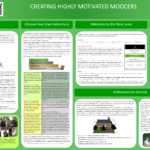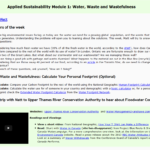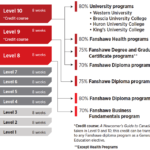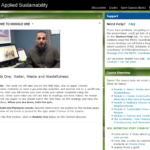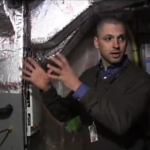MOOC Clears Pathway for Personalized Learning Environments and Curriculum
Canada’s Fanshawe College Creates Incubator as Test Bed for Core Curriculum
Canada’s Fanshawe College has taken an innovative approach that is proving quite successful. Stepping outside of the traditional credited environment has enabled them to pilot revolutionary ideas. What does this look like and how are the outcomes impacting their offerings across multiple disciplines? Let’s find out!
Taking an innovative approach, Fanshawe designed a self-directed flexible Massive Open Online Course (MOOC) with time management and student outcomes in mind. The six-week course was built modularly with optional activities. Instead of having one exit point, there are four variable outcomes. Students select the level of accomplishment they wish to pursue depending on their goals.
The four exit points are Green, Silver, Gold, and Platinum. The Green level offers bare minimum requirements and weekly quizzes. Silver includes more specific topics with discussion groups. The Gold level has more practical applications such as conducting an audit and Platinum offers more extended projects.
For the pilot, Fanshawe chose the subject of sustainability in the areas of construction, architecture, design and urban planning. This engineering course has a main core component surrounded by microelements, advanced modules, and bonus activities. Students pursue what they want to learn more about and can also raise or lower their benchmark level as they progress through the course. “Intelligent Agents” respond to certain student actions. What did Fanshawe College learn from this pilot and how have outcomes been applied across other disciplines?
The course served as an incubator to test those ideas to see whether they would be viable or beneficial in the long run and they have been. We’ve seen some normalization of those radical concepts in the core curriculum. For example, with time management, Fanshawe colleges ESL program through the ELI has shortened its course length to just eight weeks any student who has difficulties will just repeat a couple of weeks instead of an entire semester or even a year. Similarly, in terms of personalization that program has not one but seven different exit points depending on what a student’s end goal is so instead of getting a preconceived and monolithic curriculum given to them, they only get the part that they need to succeed.
Fanshawe College’s great success in stepping out of the traditional teaching and learning environment to implement revolutionary ideas is shaking things up in their credit environment. Now that’s innovation!
Stepping Outside of Traditional Credited Environment to Pilot Revolutionary Ideas
With a desire to take a more innovative approach to overcome the frustrations of a traditional academic model, Fanshawe College felt the best approach was to first pilot revolutionary ideas outside of the credited environment. They decided to incubate these ideas in a Massive Open Online Course (MOOC).
The Oxford Dictionary defines a MOOC as a course of study made available over the Internet without charge to a very large number of people. Anyone who decided to take a MOOC simply logs on to the website and signs up. The MOOC Fanshawe College designed was aimed at engineering students.
Whether re-skilling or upgrading skills of seasoned adults or providing an avenue for young adults to achieve their full potential, Fanshawe offers more than 200 degree, diploma, certificate and apprenticeship programs with flexible learning arrangements designed meet the labor market needs. Fanshawe College, located in the greater London region with multiple campuses, is one of Ontario’s largest colleges and serves close to half a million people.
When considering producing the MOOC, Fanshawe knew they couldn’t compete with world-famous professors so they decided to let the students take the lead. The subject was sustainability in the areas of construction, architecture, design and urban planning. The solution was an extremely flexible online engineering course where students defined their own learning outcomes.
Choose Your Own Exit Point
This self-directed course was designed with time management and student outcomes in mind. The course was shortened to just six weeks in length and any students who withdraw could go back into the course in a subsequent term and can pick back up where they left off.
Fanshawe College also allows students to select which level of accomplishment they wish to pursue. Instead of having one exit point, students can select from one of four outcomes that reflect their achievements and goals. The four levels of variable outcomes, Green, Gold, Silver, and Platinum, allow students to choose their own adventure by deciding how deeply they wish to go into the subject. They can raise or lower their benchmark as they progress through the course.
Color Levels Give a Gamification Feel
At the beginning of the course, for example, a student might choose to take the easy path, the Green level, with bare minimum requirements and weekly quizzes. If they decide during the course that it is too easy, they could move up to a tougher level. The Silver level offers specific topic discussion groups. The Gold level takes students into more practical applications like doing an audit. Finally, the Platinum level has students complete extended projects.
The course is designed to funnel students toward a more advanced level or level down depending on their lifestyle or workload fit. The levels follow the foundation in the field of sustainability, the Leadership in Energy and Environmental Design (LEED) certification, which is the most widely used green building rating system in the world. A LEED credential denotes proficiency in today’s sustainable design, construction, and operations standards.
This engineering course has a main core component surrounded by microelements. Not only does it allow them to add on more advanced modules, but beyond self-select they choose which bonus activities they wish to pursue based on what they want to learn more about. There are some condition restrictions. The course uses Intelligent Agents so that it can respond to certain student actions.
Personalized Learning Challenges Traditional Approach
Learning is personalized moving the student forward as they are ready. The learning management system, D2L, enables Fanshawe College to take the non-monolithic microelement approach and also allows LTI integration so third-party apps can be added. Grades are assigned according to clusters based on specialties selected. The student selects the baseline and bonus specialty. If they select Green, the lowest benchmark, for example, then the system adds categories of bonus based on the lower benchmark.
In each unit, students have mentors with subject-matter and course experts for each level. Projects are required to accommodate a focus on the selected bonus areas of choice. For example, some select building technology and engineering, some select community sustainability, city planning, or city transportation. Peer learning plays an important role as a course might have 600 students from over 100 countries. The diversity of cities or environments varies greatly as well.
Upon course completion, a certificate is issued according to baseline designated. To date, students and faculty members feel that course has been a wonderful experience and Fanshawe won an award for innovation. In the long term, this course project met its goal and served as an incubator to see if new ideas and approaches were viable or beneficial. In fact, some of the best practices that came from the course have been applied across the college in other areas quite successfully.
Radical Concepts Implemented in Core Course
According to Ryan Walmsley, co-administrator of the MOOC, the English Language Studies (ELI) program at Fanshawe has now developed a complete program with all courses shortened from 16 weeks to 8 weeks to better serve students who have difficulty completing a program level. Should those students need, they can repeat just weeks instead of a whole semester or entire year. In terms of personalization, Ryan says the course now has seven exit points instead of the traditional one so that instead of a monolithically predetermined curriculum, students are getting just the pieces that they need or want in order to succeed.
Fanshawe College did indeed find a way to overcome the frustrations of a traditional academic model and pilot revolutionary ideas. It is exciting to see how their innovative approach is being implemented across other disciplines with great success. This is an excellent example of utilizing emerging technologies to transform education to better meet students’ needs.


